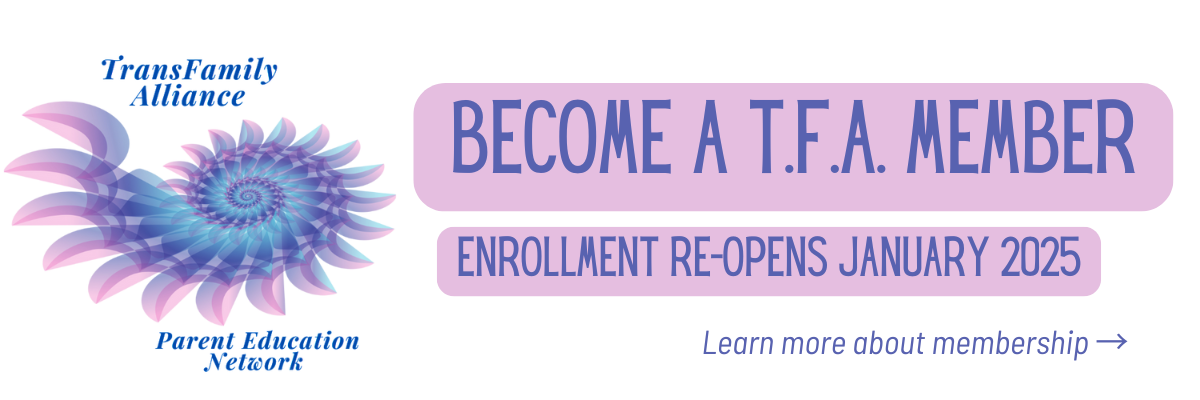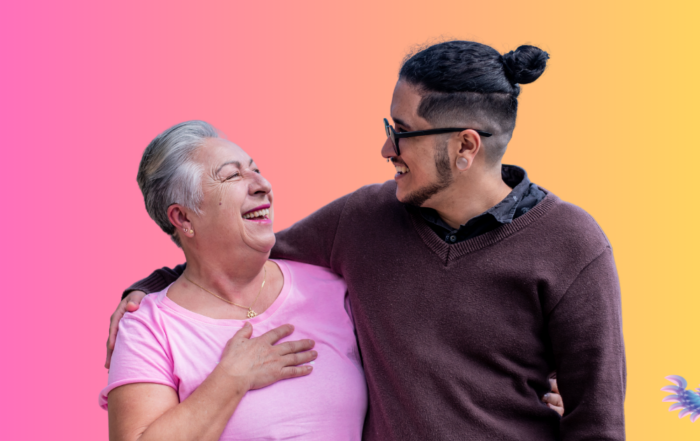
Yesterday, on Wednesday, December 4, the U.S. Supreme Court heard oral arguments in United States v. Skrmetti, an ACLU lawsuit challenging a discriminatory Tennessee law that bans transgender youth from accessing health care treatments commonly provided for cisgender youth.
Specifically, the ban violates the 14th Amendment’s Equal Protection clause, which protects not only LGBTQ+ people, but also women and people of color.
Chase Strangio is representing the ACLU in the case, and is also the first openly trans lawyer to argue in front of the Supreme Court.
As you already know, this is a pivotal moment in history, not only for trans youth and families, but for the United States itself.
And, needless to say, as a trans person or family member of someone who is, you might be studying the news and social media for updates from the hearings, sitting on the edge of your seat, and feeling more than a little emotionally exhausted.
Gentle Self-Care Reminders for Coping With the United States v. Skrmetti Case As It Unfolds…
Recovering from emotional exhaustion requires intentional self-care practices that will help replenish energy, restore balance, and promote healing. Here are three effective self-care practices to experiment with.
1. Use Grounding Techniques
Grounding exercises can help you stay present and reduce the intensity of your emotional response. By reducing that intensity, you can bypass your emotions taking over, and pushing you into more destructive behaviors.
If you’re feeling triggered by anything you are seeing or reading about the Supreme Court case, try a couple easy, simple grounding techniques…
- The 5-4-3-2-1 Technique: Focus on your senses to bring your attention back to the present moment. Identify 5 things you can see, 4 things you can touch, 3 things you can hear, 2 things you can smell, and 1 thing you can taste.
- Sensory objects: Choose a small, comforting item (a rock, fabric, or something familiar) to hold and focus on when you’re feeling triggered. Wear it or tuck it into your pocket to touch when you’re feeling anxious, angry, or triggered. Tip: If you can, dribble a few drops of lavender essential oil onto your object, so that you can activate all of your senses.
This website has a list of 30 other simple techniques you can try to help ground you when you’re feeling triggered.
2. Protect Your Emotional Energy by Saying “No”
For the next week or so, politely decline invitations or extra responsibilities. Protect your emotional energy by setting clear boundaries in both personal and professional contexts, so that you have the buffer space for recuperation.
After declining or begging off of non-essential commitments, use the time and space you’ve carved out for fun / peaceful pastimes, like reading, drawing, knitting, gardening, or cooking.
Make some soup and do some arts ‘n crafts while it simmers. Take yourself out for a nature walk, and call a friend. Make fun snacks, and put on a silly movie to watch as a family (here are some great kid-friendly snack recipes).
3. Prioritize Rest and Sleep
If you’ve been feeling emotionally exhausted, ensure you’re getting enough restorative sleep (7–9 hours for most adults) to allow your body and mind to fully recover.
Put parameters around how much news you’ll catch up on before starting your wind down routine. Avoid watching the news while getting ready for bed, and if you’re able, put your phone on “do not disturb” mode once you’re actually tucking in (if not keep the phone out of the bedroom altogether).
If bedtime doom-scrolling is one of your foibles, check out this article for tips and new understanding about breaking the habit, and this article if you’ve got a teen or young adult who also struggles with this.
4. Find Support and Solidarity Within Community
Alongside the above, reach out to the people and share a moment with the people who are having the same experience as you: they are also cycling through enthusiasm and exhaustion, because they’re part of the trans community, or love and belong with someone who is, and are internalizing the news and commentary much more deeply and personally.
Once your boundaries and priorities are set, make sure to connect with someone who is able to validate the emotions and experiences you’re having, who can make satisfying remarks about what’s reported, and ultimately also offer you the support and recognition you crave.
(Also–remember that this is what’s found in our TFA membership community!)
If you’re unable to find or connect with someone who quite understands what you’re experiencing, don’t be afraid to simply ask for what you need from those around you, even if they’re not necessarily trans. Start with the above sections (asking for your space and time to rest, digest, and reflect), and maybe request for them to check in when possible.
While we’re all watching history being made (and hopefully true justice in action), our wish for you is that you’re able to refer and use these tips for helping heal your body and mind from emotional exhaustion, alongside helping you also regain energy, mental clarity, and emotional stability for the next steps just ahead.

Yesterday, on Wednesday, December 4, the U.S. Supreme Court heard oral arguments in United States v. Skrmetti, an ACLU lawsuit challenging a discriminatory Tennessee law that bans transgender youth from accessing health care treatments commonly provided for cisgender youth.
Specifically, the ban violates the 14th Amendment’s Equal Protection clause, which protects not only LGBTQ+ people, but also women and people of color.
Chase Strangio is representing the ACLU in the case, and is also the first openly trans lawyer to argue in front of the Supreme Court.
As you already know, this is a pivotal moment in history, not only for trans youth and families, but for the United States itself.
And, needless to say, as a trans person or family member of someone who is, you might be studying the news and social media for updates from the hearings, sitting on the edge of your seat, and feeling more than a little emotionally exhausted.
Gentle Self-Care Reminders for Coping With the United States v. Skrmetti Case As It Unfolds…
Recovering from emotional exhaustion requires intentional self-care practices that will help replenish energy, restore balance, and promote healing. Here are three effective self-care practices to experiment with.
1. Use Grounding Techniques
Grounding exercises can help you stay present and reduce the intensity of your emotional response. By reducing that intensity, you can bypass your emotions taking over, and pushing you into more destructive behaviors.
If you’re feeling triggered by anything you are seeing or reading about the Supreme Court case, try a couple easy, simple grounding techniques…
- The 5-4-3-2-1 Technique: Focus on your senses to bring your attention back to the present moment. Identify 5 things you can see, 4 things you can touch, 3 things you can hear, 2 things you can smell, and 1 thing you can taste.
- Sensory objects: Choose a small, comforting item (a rock, fabric, or something familiar) to hold and focus on when you’re feeling triggered. Wear it or tuck it into your pocket to touch when you’re feeling anxious, angry, or triggered. Tip: If you can, dribble a few drops of lavender essential oil onto your object, so that you can activate all of your senses.
This website has a list of 30 other simple techniques you can try to help ground you when you’re feeling triggered.
2. Protect Your Emotional Energy by Saying “No”
For the next week or so, politely decline invitations or extra responsibilities. Protect your emotional energy by setting clear boundaries in both personal and professional contexts, so that you have the buffer space for recuperation.
After declining or begging off of non-essential commitments, use the time and space you’ve carved out for fun / peaceful pastimes, like reading, drawing, knitting, gardening, or cooking.
Make some soup and do some arts ‘n crafts while it simmers. Take yourself out for a nature walk, and call a friend. Make fun snacks, and put on a silly movie to watch as a family (here are some great kid-friendly snack recipes).
3. Prioritize Rest and Sleep
If you’ve been feeling emotionally exhausted, ensure you’re getting enough restorative sleep (7–9 hours for most adults) to allow your body and mind to fully recover.
Put parameters around how much news you’ll catch up on before starting your wind down routine. Avoid watching the news while getting ready for bed, and if you’re able, put your phone on “do not disturb” mode once you’re actually tucking in (if not keep the phone out of the bedroom altogether).
If bedtime doom-scrolling is one of your foibles, check out this article for tips and new understanding about breaking the habit, and this article if you’ve got a teen or young adult who also struggles with this.
4. Find Support and Solidarity Within Community
Alongside the above, reach out to the people and share a moment with the people who are having the same experience as you: they are also cycling through enthusiasm and exhaustion, because they’re part of the trans community, or love and belong with someone who is, and are internalizing the news and commentary much more deeply and personally.
Once your boundaries and priorities are set, make sure to connect with someone who is able to validate the emotions and experiences you’re having, who can make satisfying remarks about what’s reported, and ultimately also offer you the support and recognition you crave.
(Also–remember that this is what’s found in our TFA membership community!)
If you’re unable to find or connect with someone who quite understands what you’re experiencing, don’t be afraid to simply ask for what you need from those around you, even if they’re not necessarily trans. Start with the above sections (asking for your space and time to rest, digest, and reflect), and maybe request for them to check in when possible.
While we’re all watching history being made (and hopefully true justice in action), our wish for you is that you’re able to refer and use these tips for helping heal your body and mind from emotional exhaustion, alongside helping you also regain energy, mental clarity, and emotional stability for the next steps just ahead.








